Chandasi Coal Mandi: Asia's Largest Black Hell Where Laborers Pay with Their Health
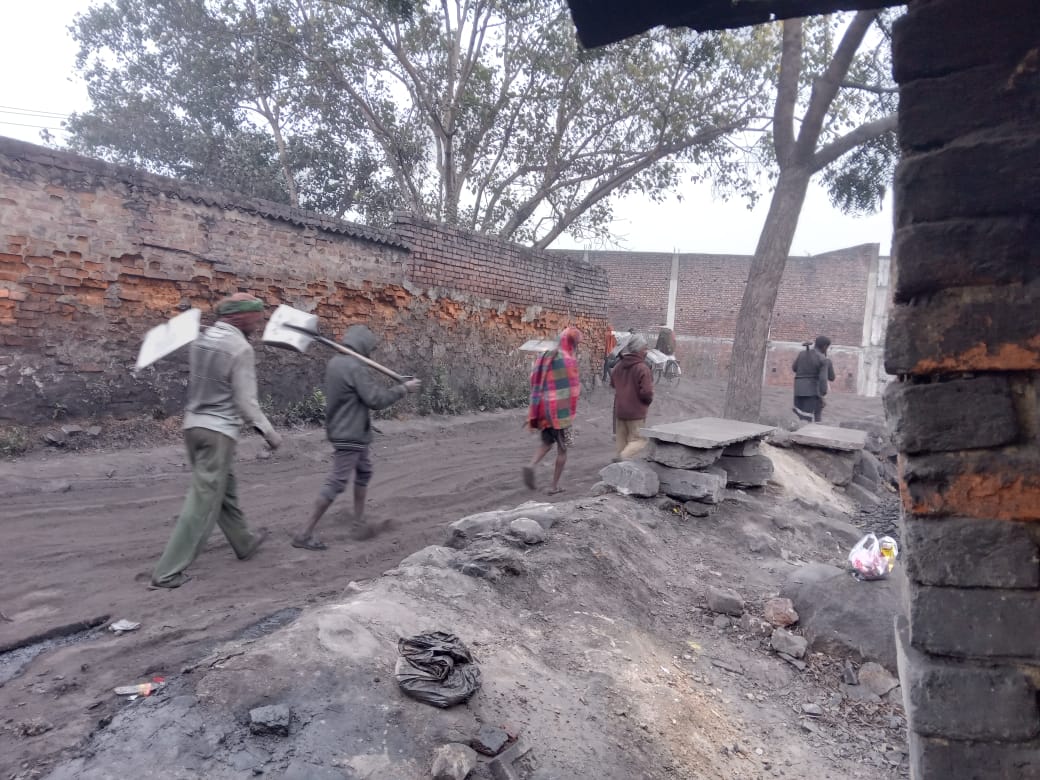
Pavan Kumar Maurya, TwoCircles.net
Mughalsarai, Chandauli: The Chandasi Coal Mandi, located just five kilometers from Varanasi in Chandauli district, Uttar Pradesh, is gripped by severe cold since December 31, 2024. The temperature hovers around 10°C, and a cold wave blows through the area in the afternoon. The sky is overcast, and clouds of coal dust and ash swirl through the air.
Amidst the hum of hammers and the activity of laborers unloading coal, workers who have finished their tasks rush to the hand pumps to wash their hands and feet, stained with soot. Situated across the Ganga, this bustling market is one of the largest coal markets in Asia and lies in the parliamentary constituency of Prime Minister Narendra Modi.
[caption id="attachment_451107" align="aligncenter" width="1040"]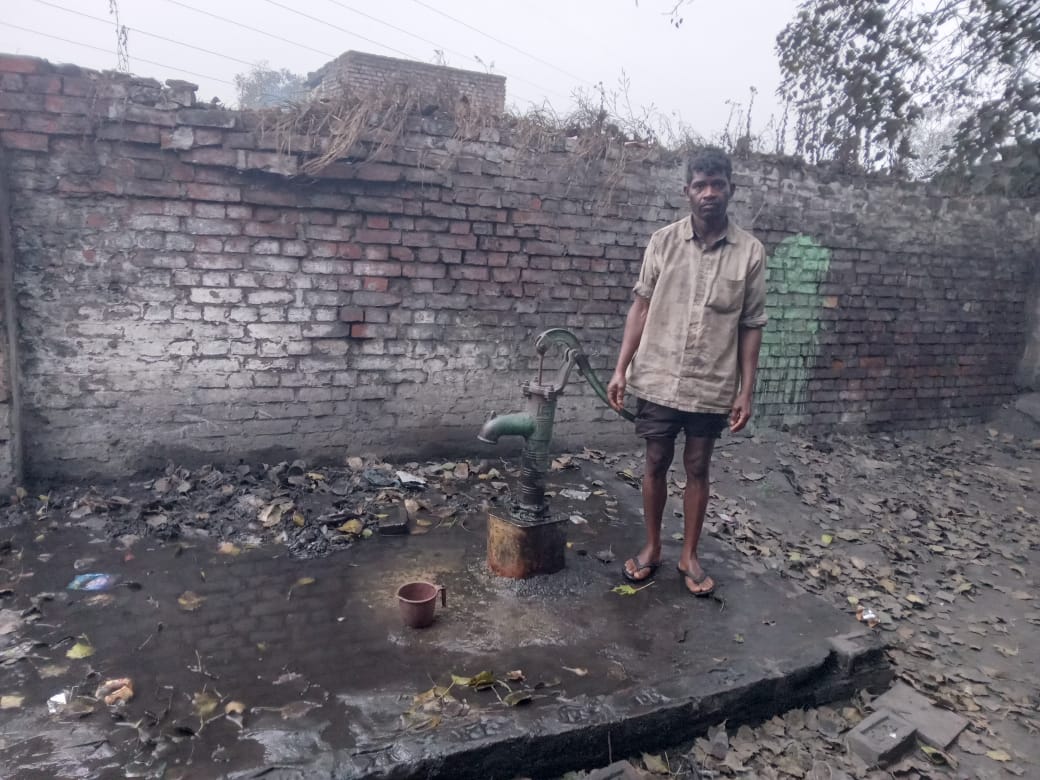 Lalmuni stained with coal soot.[/caption]
Lalmuni stained with coal soot.[/caption]
The Toll on Laborers' Health
Lalmuni, a resident of Bihar’s Kaimur district, has been working in the Chandasi coal market for five years. His face is swollen, blackened from head to toe with coal soot, a testament to the toll his work has taken. A daily wage laborer, he earns between Rs 200 and Rs 300, depending on the work available. His job is to unload coal from trucks coming from Madhya Pradesh, Chhattisgarh and Jharkhand.
"I am the sole breadwinner for my family," Lalmuni told TwoCircles.net. "There is no consistent work in my village, but here in the coal market, I get daily wages against cash. The problem is that the dust from the coal affects my health. When I inhale, the coal ash settles in my chest and lungs. It also irritates my eyes, and the soot flows out as sweat. I feel breathlessness and sometimes suffer cough and fever that lasts for days. This is the daily reality here. We have no choice but to endure it. The soot and dust are with us even when we sit down to eat."
[caption id="attachment_451109" align="aligncenter" width="1040"]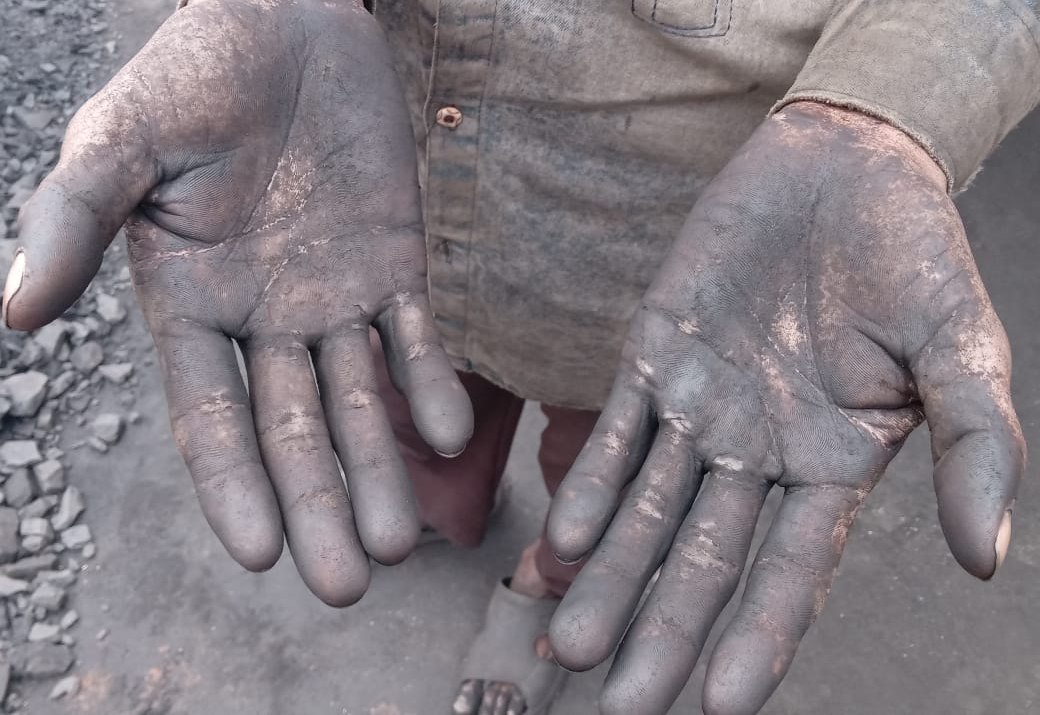 The palms of a coal laborer[/caption]
The palms of a coal laborer[/caption]
Thousands of workers, as well as the local population, are breathing in toxic air. Over 40,000 people from surrounding villages like Dulhipur, Mahabalpur, Satpokhari, Bisaudhi, Bagahi, Harikeshpur, Dandi, Karbat and Chandasi are impacted by the pollution. The air quality has deteriorated to the point where respiratory diseases, including tuberculosis (TB), are on the rise. A report from the State Pollution Control Board in June 2022 recommended relocating the coal market, but the government has yet to act on it.
Laborers Struggling with Poverty, Pollution
Kesar Singh Kushwaha, president of the Chandasi-Mughalsarai Coal Industry Laborers Union, said over 5,000 laborers work in this coal market, which stretches over four to five kilometers. These laborers come from various parts of Jharkhand, Bihar and Uttar Pradesh. Most of them belong to marginalised communities — Dalits, Adivasis, Pasmanda Muslims and other backward classes.
"The workers face double hardship," Kushwaha said, adding, "They work in dangerous conditions and are paid very little, often Rs 200 to Rs 250 per day. For the last two to three years, work has been scarce. Many workers are struggling to make ends meet. The coal market brings in huge revenue for the Mughalsarai Municipality, but there are no facilities for the workers. There is no clean drinking water, no toilets and no healthcare facilities. It is like living in a hell of black dust and poverty."
[caption id="attachment_451105" align="aligncenter" width="1040"]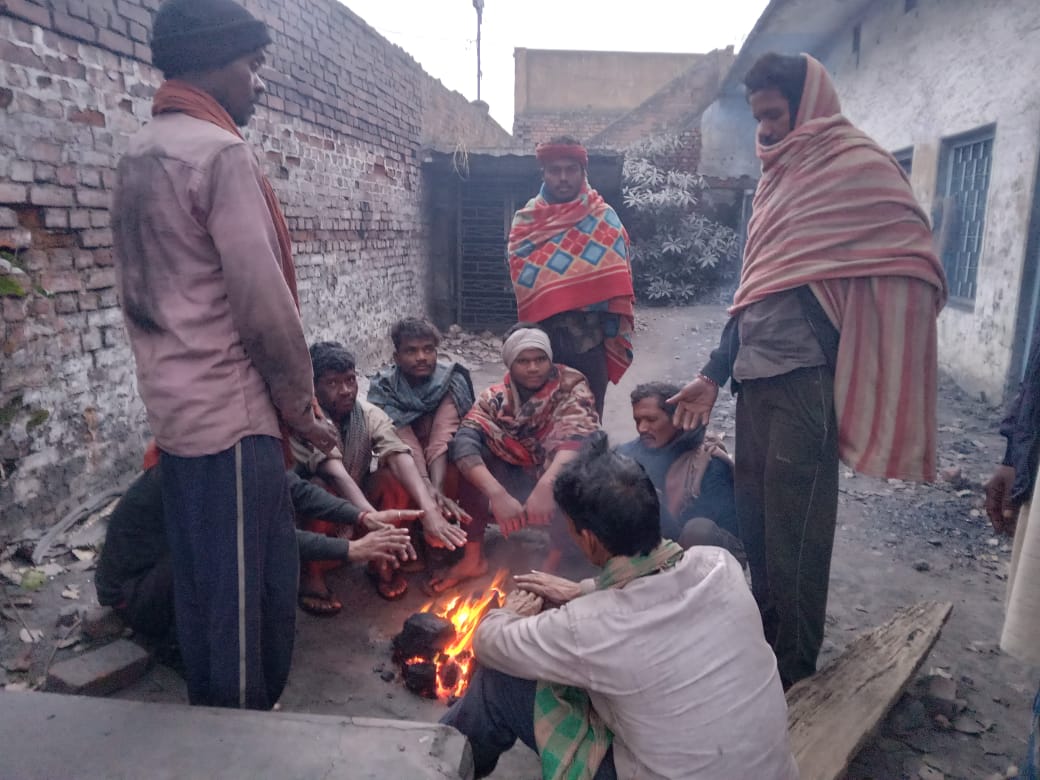 Workers warming themselves by bonfire to protect themselves from the harsh cold.[/caption]
Workers warming themselves by bonfire to protect themselves from the harsh cold.[/caption]
Despite these harsh conditions, many workers continue to labor because they have no other option to feed their families.
The Daily Struggle of Workers
Kailash, a laborer from Bhagalpur, describes the daily ordeal. "When we unload the coal, the dust flies around. It gets into our eyes, nose, ears and mouth," he says. "But I have no choice. I need to feed my family. During the rainy season, the situation worsens."
Sarmu Ram, a laborer from Kaimur, recounts a typical day in the coal market. "Today, I emptied just one truck, earning Rs 250. Working in coal dust is difficult —coal comes out with sweat and spit. I have been suffering from fever and cough. I try to get some relief by eating jaggery and thyme, but if the problem worsens, I consult a doctor."
Toxic Dust and Health Hazards
Dr. Kumar Bhaskar, a cardiologist at Sunrise Hospital in Varanasi, warned about the health risks posed by the coal dust. "Dust particles from loading and unloading coal can cause severe eye irritation, nasal allergies and lung damage," he explained. "The deposition of silica particles can lead to incurable diseases like silicosis. Workers are at risk of asthma, tuberculosis and heart problems. Some even suffer heart attacks."
[caption id="attachment_451106" align="aligncenter" width="1040"]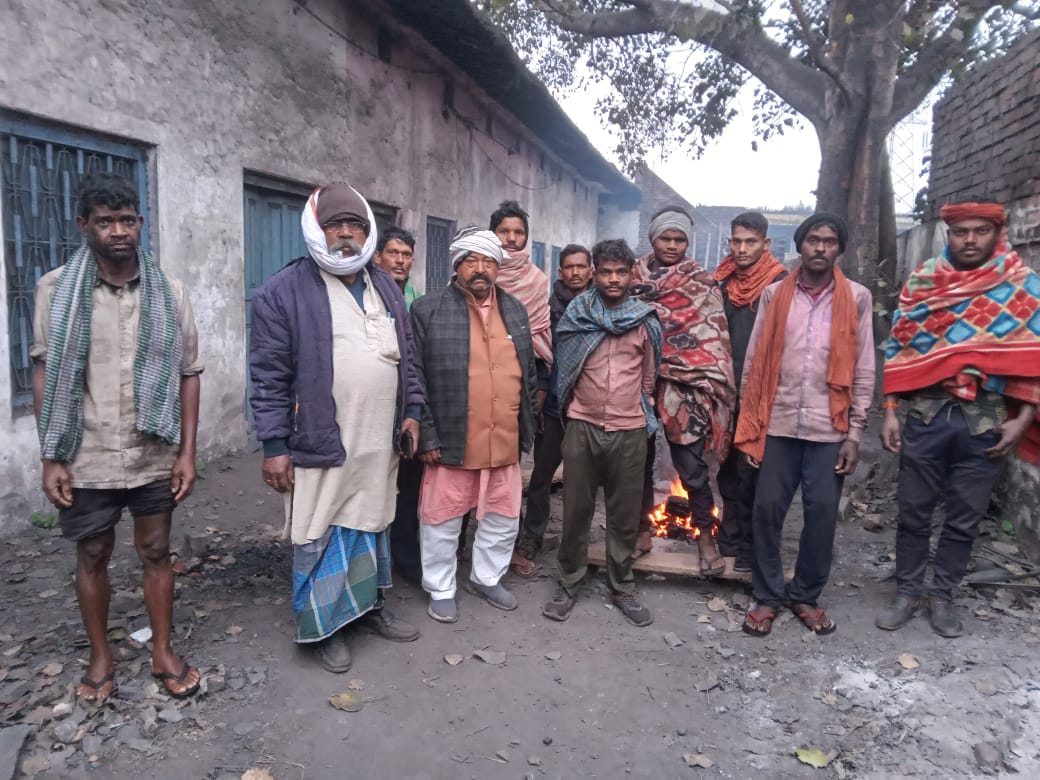 President Kesar Singh Kushwaha with the laborers[/caption]
President Kesar Singh Kushwaha with the laborers[/caption]
A Call for Action
Ram Gahan Bind, vice president of the workers’ union, urges for immediate action. "We need clean drinking water and healthcare facilities here. The workers risk their lives daily, yet they receive little support. Despite the coal market generating revenue for the government, there are no tangible efforts to improve the lives of the workers," he said.
The state government has taken some steps. A tuberculosis diagnostic center in Mughalsarai treats 50-52 TB patients monthly, many of whom are coal market workers. "Most of the patients are from the labour community, but we are also seeing women, children and elderly from the town. The most affected are those in the 45-50 age group," said Ramesh Chandra Yadav, in charge of the center. "If patients come to us on time, we can treat them. But many delay treatment that sometimes leads to death."
[caption id="attachment_451103" align="aligncenter" width="780"]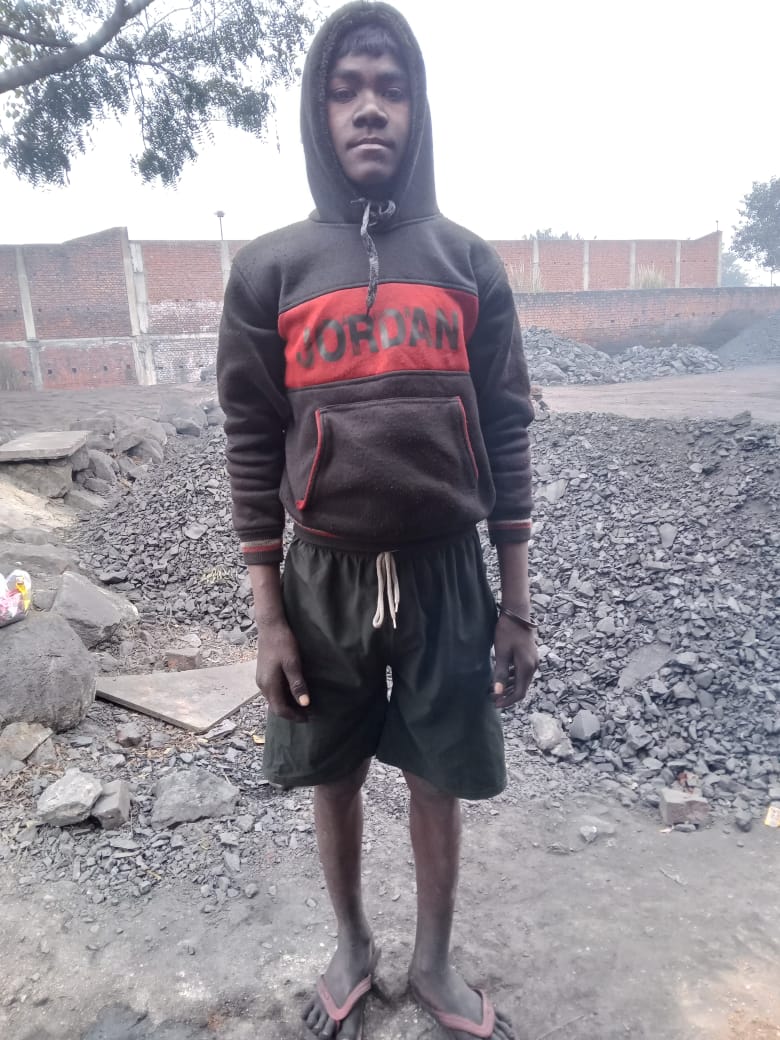 Anil, a teenager from Sonbhadra who works in the coal market.[/caption]
Anil, a teenager from Sonbhadra who works in the coal market.[/caption]
A Push to Relocate the Coal Market
Local leaders, including Gargi Singh Patel, president of the Samajwadi Party in Chandauli, are campaigning to get the coal market relocated away from residential areas. "The coal market is poisoning the lives of thousands. The construction of a four-lane road is already underway, which might help. But we need to shift the market to protect the health and livelihoods of the people here," Patel said.
Dr. Bhaskar also emphasises the need for preventive measures. "Regular water sprinkling and protective gear like masks can help mitigate the effects of coal dust. But the ultimate solution is to relocate the market to a less populated area."
[caption id="attachment_451104" align="aligncenter" width="1040"]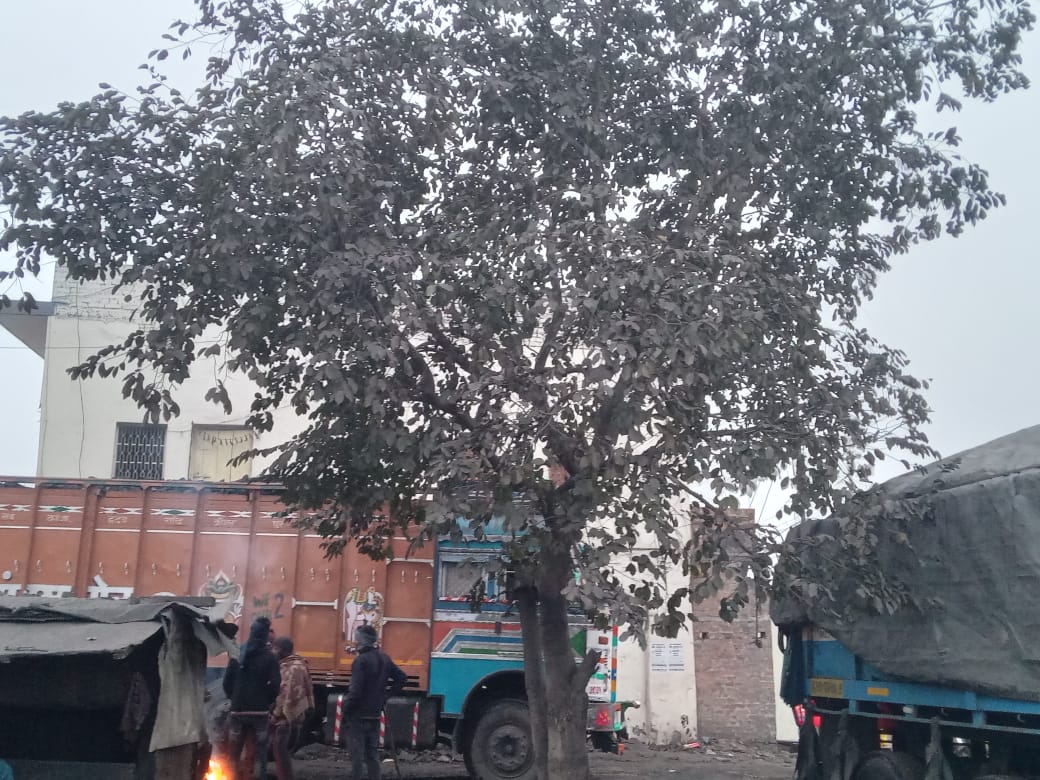 Soot and dust stuck on trees in Chandasi coal market.[/caption]
Soot and dust stuck on trees in Chandasi coal market.[/caption]
The Government’s Response
Despite recommendations from the Uttar Pradesh State Pollution Control Board to relocate the Chandasi Coal Mandi, there has been no substantial action. The report was sent to local authorities in June 2022, but a decision has yet to be made.
Alok Kumar, the sub-divisional magistrate, Mughalsarai, acknowledged the issue. "No one has formally complained to me about the air pollution from the coal market. However, we are aware of the problem. Any solution that can be implemented will be pursued," he noted.
The lives of thousands continue to be at risk, and the fight for better working conditions and cleaner air remains ongoing. The laborers of Chandasi Coal Mandi are trapped in a cycle of pollution and poverty, with little hope of relief unless immediate action is taken to address their plight.
